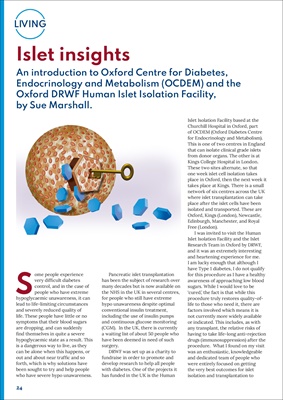
24
LIVING
Islet insights
An introduction to Oxford Centre for Diabetes,
Endocrinology and Metabolism (OCDEM) and the
Oxford DRWF Human Islet Isolation Facility,
by Sue Marshall.
Some people experience
very difficult diabetes
control, and in the case of
people who have extreme
hypoglycaemic unawareness, it can
lead to life-limiting circumstances
and severely reduced quality of
life. These people have little or no
symptoms that their blood sugars
are dropping, and can suddenly
find themselves in quite a severe
hypoglycaemic state as a result. This
is a dangerous way to live, as they
can be alone when this happens, or
out and about near traffic and so
forth, which is why solutions have
been sought to try and help people
who have severe hypo unawareness.
Pancreatic islet transplantation
has been the subject of research over
many decades but is now available on
the NHS in the UK in several centres,
for people who still have extreme
hypo unawareness despite optimal
conventional insulin treatment,
including the use of insulin pumps
and continuous glucose monitoring
(CGM). In the UK, there is currently
a waiting list of about 50 people who
have been deemed in need of such
surgery.
DRWF was set up as a charity to
fundraise in order to promote and
develop research to help all people
with diabetes. One of the projects it
has funded in the UK is the Human
Islet Isolation Facility based at the
Churchill Hospital in Oxford, part
of OCDEM (Oxford Diabetes Centre
for Endocrinology and Metabolism).
This is one of two centres in England
that can isolate clinical grade islets
from donor organs. The other is at
Kings College Hospital in London.
These two sites alternate, so that
one week islet cell isolation takes
place in Oxford, then the next week it
takes place at Kings. There is a small
network of six centres across the UK
where islet transplantation can take
place after the islet cells have been
isolated and transported. These are
Oxford, Kings (London), Newcastle,
Edinburgh, Manchester, and Royal
Free (London).
I was invited to visit the Human
Islet Isolation Facility and the Islet
Research Team in Oxford by DRWF,
and it was an extremely interesting
and heartening experience for me.
I am lucky enough that although I
have Type 1 diabetes, I do not qualify
for this procedure as I have a healthy
awareness of approaching low blood
sugars. While I would love to be
'cured,' the fact is that while this
procedure truly restores quality-oflife
to those who need it, there are
factors involved which means it is
not currently more widely available
or indicated. This includes, as with
any transplant, the relative risks of
having to take life-long anti-rejection
drugs (immunosuppression) after the
procedure. What I found on my visit
was an enthusiastic, knowledgeable
and dedicated team of people who
were entirely focused on getting
the very best outcomes for islet
isolation and transplantation to